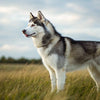Understanding Schipperke Personality Traits: A Comprehensive Guide for Dog Lovers
- Houndsy
Table of Contents
- Introduction
- The Schipperke: A Brief Overview
- Personality Traits of the Schipperke
- Training and Socialization
- Health Considerations
- Daily Care and Lifestyle
- Conclusion
Introduction
Imagine a small dog with a big personality, always ready to engage, protect, and entertain. That's the Schipperke for you! These enchanting little companions are known for their lively spirit and intelligent demeanor, making them a favorite among dog enthusiasts. In fact, did you know that Schipperkes are often described as the "little captains" of the dog world due to their bold and fearless nature? Their name, derived from the Flemish word for "little captain," reflects their historical role as vigilant watchdogs aboard canal boats in Belgium.
As we delve into the fascinating world of Schipperke personality traits, we aim to equip you with a thorough understanding of what makes these dogs so unique. By the end of this post, you will learn about their energetic and affectionate nature, their communication styles, and the best practices for raising a Schipperke companion. We will also explore how their characteristics impact their training, socialization, and overall care.
Let’s embark on this journey together, reflecting on our own experiences and thinking about how to create the best environment for our furry friends!
The Schipperke: A Brief Overview
A Rich History
The Schipperke is a breed with deep roots, dating back to the 15th century in Belgium. Originally bred as a small sheepdog, they quickly gained popularity not only for their herding abilities but also for their role as watchdogs on boats. Their distinctive appearance, characterized by a fox-like face and a thick double coat, makes them instantly recognizable.
Physical Characteristics
Typically weighing between 10 to 16 pounds and standing 10 to 13 inches tall, Schipperkes are compact yet robust. Their solid black coat, which can occasionally appear in shades of chocolate or cream, adds to their charm. Grooming is relatively straightforward, requiring only weekly brushing to keep their coat healthy and manageable.
Personality Traits of the Schipperke
1. Energetic and Playful
One of the standout Schipperke personality traits is their boundless energy. These dogs were bred to be active and alert, making them ideal companions for individuals and families who enjoy an active lifestyle. Schipperkes thrive on playtime, and daily exercise is a must to keep them happy and healthy. Whether it’s a game of fetch, a brisk walk, or a swim, they are always eager to engage.
2. Intelligent and Curious
Schipperkes are highly intelligent dogs with a natural curiosity about their environment. This intelligence can be a double-edged sword; while it makes them quick learners, it also means they can become bored easily. Without sufficient mental and physical stimulation, they may resort to destructive behaviors, such as chewing and digging. Engaging them with puzzle toys, training sessions, and interactive games is essential to keep their minds sharp.
3. Stubborn Yet Eager to Please
While Schipperkes are known for their intelligence, they can also exhibit a stubborn streak. This independent nature can make training challenging for novice owners. However, with patience, consistency, and positive reinforcement, Schipperkes can excel in obedience training. It’s important to start training early and incorporate fun, engaging methods to keep their attention.
4. Protective and Alert
True to their roots as watchdogs, Schipperkes are naturally protective of their families and home. They are known to bark at strangers and unfamiliar noises, which makes them effective watchdogs. However, this protective instinct can also lead to excessive barking if not managed properly. Early socialization and training can help mitigate these tendencies, allowing Schipperkes to distinguish between genuine threats and harmless visitors.
5. Affectionate and Loyal
Schipperkes form strong bonds with their families and are known for their loyalty. They thrive on human interaction and enjoy being involved in family activities. Their playful and affectionate nature makes them great companions, particularly for active families or individuals who can provide them with plenty of attention and engagement.
Training and Socialization
The Importance of Early Training
Given their intelligence and occasionally stubborn demeanor, early training and socialization are crucial for Schipperkes. Exposing them to various people, environments, and experiences during their formative months will help them grow into well-adjusted adult dogs. Puppy classes and group training sessions can provide valuable socialization opportunities while teaching essential obedience skills.
Training Techniques
When training a Schipperke, it’s essential to use positive reinforcement techniques to encourage good behavior. Here are a few effective methods:
-
Reward-Based Training: Use treats, toys, and praise to reinforce desired behaviors. Schipperkes respond well to rewards, making them more likely to repeat the behavior.
-
Consistency is Key: Establish clear commands and stick to them. Inconsistency can confuse your Schipperke, making training more challenging.
-
Short, Engaging Sessions: Keep training sessions brief and fun to maintain your dog's interest. Aim for 5-10 minute sessions several times a day rather than long, tedious training periods.
Socialization Tips
Socializing your Schipperke is essential to help them develop a positive attitude toward other dogs and people. Here are a few tips to ensure successful socialization:
-
Introduce Gradually: Start by introducing your Schipperke to new experiences slowly and in controlled settings. Gradually increase the complexity of the environments they encounter.
-
Positive Experiences: Ensure that new encounters are positive by using treats and praise to reward calm behavior. This builds confidence and helps prevent fear-based reactions.
-
Regular Outings: Take your Schipperke on regular outings to parks, pet stores, and dog-friendly events to expose them to different sights, sounds, and smells.
Health Considerations
Like all dog breeds, Schipperkes can be prone to specific health issues. Being informed and proactive about their health is essential for their well-being. Here are some common health considerations:
-
Hip Dysplasia: A genetic condition that can lead to arthritis and mobility issues. Regular veterinary check-ups and maintaining a healthy weight can help manage this risk.
-
Thyroid Issues: Schipperkes can be prone to hypothyroidism, which may require regular monitoring by a veterinarian.
-
Eye Conditions: Regular eye examinations can help catch any potential issues early, ensuring prompt treatment and care.
Daily Care and Lifestyle
Exercise Needs
Schipperkes are energetic dogs that require at least 30-60 minutes of exercise daily. Engaging them in various activities, such as walks, play sessions, or dog sports, will keep them physically fit and mentally stimulated.
Grooming Requirements
Despite their thick double coat, Schipperkes are relatively low-maintenance in terms of grooming. Regular brushing, especially during shedding seasons, will help keep their coat healthy and reduce loose hair in your home.
Diet and Nutrition
A well-balanced diet is vital for a Schipperke's health. Consult your veterinarian for recommendations on high-quality dog food formulated for small breeds. Monitor portion sizes to prevent obesity, as Schipperkes love to eat and can easily gain weight if not managed.
Conclusion
In summary, the Schipperke is a charming breed characterized by its vibrant personality, intelligence, and loyalty. Understanding their unique traits will help you create a fulfilling and harmonious relationship with your furry companion. By providing them with regular exercise, mental stimulation, and consistent training, you can ensure that your Schipperke thrives in your home.
As we reflect on the Schipperke's personality traits, consider how they fit into your lifestyle. Are you ready to embrace the joyful, spirited nature of this delightful breed? If you're looking for a companion that brings energy and love into your life, the Schipperke may be the perfect match for you.
FAQ
Q: How much exercise does a Schipperke need daily?
A: Schipperkes require at least 30-60 minutes of exercise daily. Engaging them in various activities, such as walks, play sessions, or dog sports, is essential to keep them physically fit and mentally stimulated.
Q: Are Schipperkes good with children?
A: Yes, Schipperkes can be great companions for children. They are generally affectionate and playful, but supervision is always recommended during interactions to ensure a positive experience for both the child and the dog.
Q: How do I train a Schipperke?
A: Use positive reinforcement techniques, keep training sessions short and engaging, and be consistent with commands. Early socialization and training classes are also beneficial in helping them develop good behaviors.
Q: What common health issues should I be aware of?
A: Schipperkes can be prone to hip dysplasia, thyroid issues, and certain eye conditions. Regular veterinary checks and a healthy lifestyle can help manage these risks.
Q: How often should I groom my Schipperke?
A: Schipperkes require weekly brushing to maintain their coat, with more frequent grooming during shedding seasons. They are relatively low-maintenance when it comes to grooming tasks.













